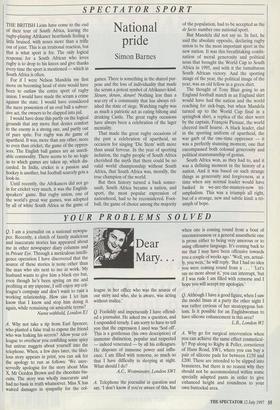SPECTATOR SPORT
National pride
Simon Barnes
THE BRITISH Lions have come to the end of their tour of South Africa, leaving the rugby-playing Afrikaner heartlands feeling a little bruised, with noses more than a trifle out of joint. This is an irrational reaction, but that is what sport is for. The only logical response for a South African who loves rugby is to drop to his knees and give thanks every time the sport is mentioned — which in South Africa is often.
For if I were Nelson Mandela my first move on becoming head of state would have been to outlaw the entire sport of rugby union. I would have made the scrum a crime against the state. I would have considered the mere possession of an oval ball a subver- sive act, the owners to be clapped into jail.
I would have done this partly on the logical grounds that any move that denies comfort to the enemy is a strong one, and partly out of pure spite. For rugby was the game of apartheid. It was, more than any other, more so even than cricket, the game of the oppres- sors. The English ball games are an unreli- able commodity. There seems to be no logic as to which games are taken up, which dis- carded. In India, cricket is a passion and hockey is another, but football scarcely gets a look-in.
Until recently, the Afrikaners did not go in for cricket very much, it was the English- speakers' game. But rugby union, one of the world's great war games, was adopted by all of white South Africa as the game of games. There is something in the shared pur- pose and the loss of individuality that made the scrum a potent symbol of Afrikaner-kind. Slaum, skrum, skrum! Nothing less than a war-cry of a community that has always rel- ished the state of siege. Watching rugby was as much a patriotic act as eating biltong and drinking Castle. The great rugby occasions have always been a celebration of the lager mentality.
That made the great rugby occasions of the past a celebration of apartheid, an occasion for singing Die Stem' with more than usual fervour. In the year of sporting isolation, the rugby people of South Africa cherished the myth that there could be no valid world championship without South Africa, that South Africa was, morally, the true champion of the world.
But then history turned a back somer- sault, South Africa became a nation, and sport, the most popular expression of nationhood, had to be reconsidered. Foot- ball, the game of choice among the majority of the population, had to be accepted as the de facto number one national sport.
But Mandela did not say so. In fact, he said the absolute opposite, declaring rugby union to be the most important sport in the new nation. It was this breathtaking combi- nation of moral generosity and political nous that brought the World Cup to South Africa in 1995, and with it the tumultuous South African victory. And the sporting image of the year, the political image of the year, was an old fellow in a green shirt.
The thought of Tony Blair going to an England football match in an England shirt would have had the nation and the world reaching for sick-bags, but when Mandela turned up to the World Cup final in a springbok shirt, a replica of the shirt worn by the captain, Francois Pienaar, the world cheered itself hoarse. A black leader, clad in the sporting uniform of apartheid, the war garb of the one-time oppressor — it was a perfectly stunning moment, one that encompassed both colossal generosity and political stuntsmanship of genius.
South Africa won, as they had to, and it was a defining moment in the history of a nation. And it was based on such strange things as generosity and forgiveness, at a time when any normal leader would have basked in we-are-the-masters-now tri- umphalism. This was a triumph all right, but of a strange, new and subtle kind: a tri- umph of hope.


























































 Previous page
Previous page